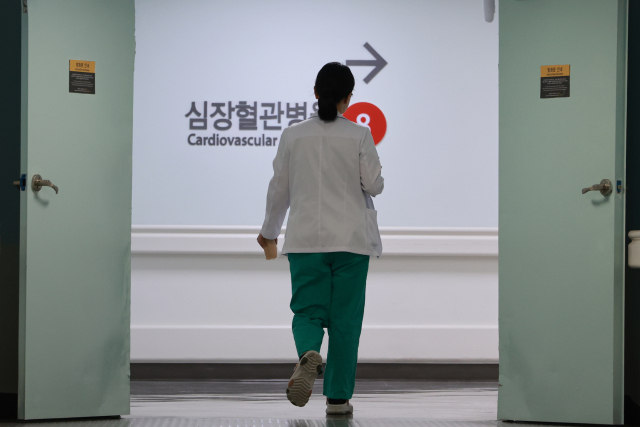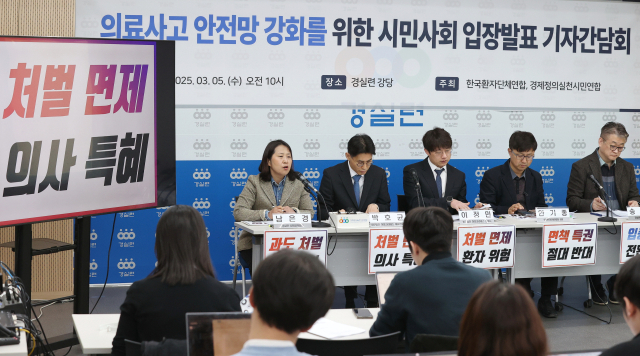Kim Mi-ae, a Member of the National Assembly, Presentation at Policy Forum
Doctors Avoid Essential Medical Services Due to Legal Burdens of Unavoidable Accidents
Civil Society: ‘Excessive Legal Risk’ Claims Lack Basis,

A medical staff member is moving in a university hospital in Seoul. Yonhap News,
, ‘[Seoul Economy] ‘,
,
, ‘The government will unveil a draft on the “Medical Accident Safety Net Establishment Plan,” a key component of the second implementation plan for medical reform, at a policy forum held in the National Assembly on the 6th. The medical community is calling for a fundamental measure to protect medical staff following medical accidents, and this announcement serves as a response to such demands. However, some patient and civil society groups oppose the move, arguing it could be unconstitutional and cater only to doctors, creating a privileged law.’,
,
, ‘According to the National Assembly and the Ministry of Health and Welfare on the 5th, Kim Mi-ae, a ruling party secretary of the Health and Welfare Committee, will host a “Policy Forum on Strengthening the Medical Accident Safety Net” at the National Assembly Library’s auditorium on the 6th. Kang Jun, Director of the Medical Reform Division at the Ministry of Welfare, will introduce the safety net establishment plan, followed by discussions and Q&A sessions with various experts. Kim’s office described the forum as an opportunity to listen to and discuss various opinions from experts and on-site practitioners to seek rational solutions and policy and legislative tasks for medical accidents.’,
,
, ‘The medical community claims that the legal burdens from no-fault and unavoidable medical accidents are a major reason for avoiding high-risk, complex, low-compensation essential medical services. There is particularly strong opposition regarding a recent court ruling that held a resident doctor jointly liable for an illegal act in a medical accident involving a patient injured from dating violence.’,
,
, ‘However, civil society holds a different view. The Citizens’ Coalition for Economic Justice and the Korea Patient Organization held a press conference at the Coalition’s hall in Jongno, Seoul, on the 5th, emphasizing that legislation should prioritize the obligation to explain medical accidents and ease the burden of proof over providing special privileges for doctors.’,
,
,

At the press conference “Civil Society Statement for Strengthening the Medical Accident Safety Net” held at the Citizens’ Coalition for Economic Justice in Jongno, Seoul, on the 5th, Nam Eun-kyung, head of the Coalition’s social policy team, is speaking. Yonhap News,
,
, ‘Park Ho-gyun, a lawyer at the law firm Hippocrates and a special committee expert for medical reform, said, “The government’s proposed plan is drastic when viewed in light of existing legal frameworks and the practical status of medical accidents.” He argued that the government plan implies leniency for essential medical accidents unless grossly negligent, which contradicts the equality principle as it seeks not to apply the criminal negligence causing death or injury charge to doctors. He pointed out that firefighters, police officers, and other professions could also demand similar exemptions, making it hard to justify denying them.’,
,
, ‘Park also questioned the idea of limiting criminal prosecution only to essential medical field cases, arguing that the concept of essential medical care is vague and abstract. He noted that surgical removal of facial tumors in plastic surgery or melanoma treatment in dermatology could fall under essential medical care, sparking inevitable social controversy.’,
,
, ‘Attorney Lee Jung-min, also from the law firm Hippocrates, who attended the press conference, criticized the claim of excessive criminal prosecution or investigation of medical professionals as unfounded. He noted that although the Korean Medical Association claims the number of work-related criminal negligence cases involving doctors in Korea is 754.8 on average per year, 31.5 times higher than in the UK, this figure refers to suspects rather than defendants. Based on Supreme Court judgments, the number of criminal charges related to medical accidents per year is estimated at 30-40 cases.’,
,
, ‘An Gi-jong, president of the Korea Patient Organization, remarked that if simple negligence were exempted from charges, apart from 12 illegal acts such as unauthorized surgery, it would become a privileged law only for doctors.’,
,
,

